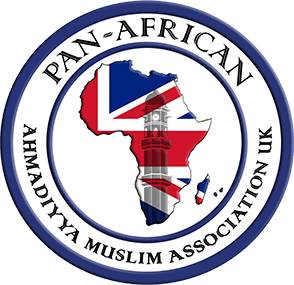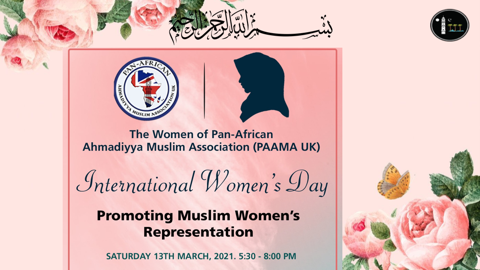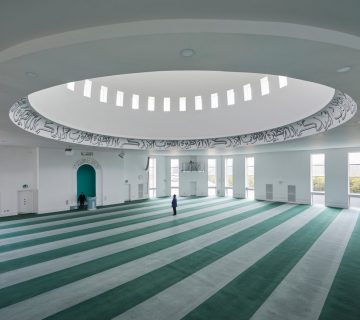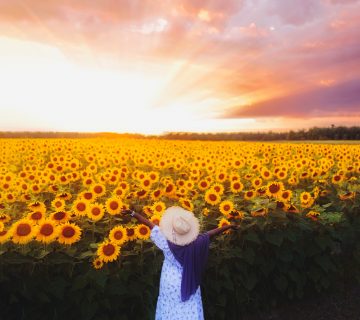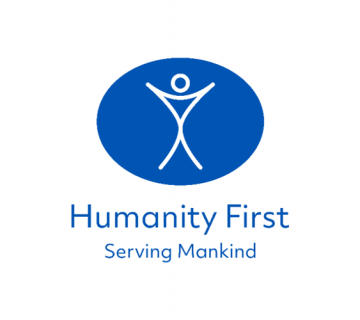PAAMA LAJNA UK
INTERNATIONAL WOMEN’S DAY
COMMEMORATION EVENT
13TH MARCH 2021
The 2021 International Women’s Day (IWD) was celebrated across the world on Monday, 8th of March 2021. However, PAAMA Lajna UK commemorated the day on Sat 13th March 2021 with the theme “Promoting Muslim Women’s Participation”
The event started with the recitation of the Holy Quran by Sister Hibbatul Rasheed Sanni; English translation, by Sister Janat Kusi. One of our grandmothers, Hajia Hameeda Addo, said the opening prayers, followed by Qaseeda rendition with English translation by Sister Lateefat Motajo.
Mrs Faosat Sanni, National PAAMA Lajna UK, delivered a Welcome Address after leading the members to recite the Lajna Pledge. She thanked Allah Almighty for making it possible for us to continue to come together virtually on different programmes despite the challenging times we found ourselves in. She also expressed appreciation to the panellists, guests, members and other non-PAAMA participants.
Speaking on the theme, she recalled that our Beloved Huzur (atba) in October 2020 during a virtual mulaqat with Mauritius, instructed the National Lajna Amla to book their own separate mulaqat, in order to interact directly with the ladies. What a great example of promoting women’s participation!
Continuing, she gave example of how some parents, discriminate among their children at home, when they make girls do more house chores than the boys. She emphasised, however that the event is not about comparing men and women – men and women are created and wired in their unique ways to complement each other – but to highlight how to promote participation, which we can do in various ways including, acquiring both secular and religious education. She cited the example of Hazrat Ayesha (ra) who was a teacher not only for women but also men. Hazrat Ayesha (ra) was able to do so from the standpoint of knowledge.
Another way of promoting women’s participation is what is currently being practised by PAAMA Lajna Amla where ladies are encouraged to share beneficial information regarding careers/job prospects, free online courses, immigration information etc. on our WhatsApp platforms in order to inform, to educate, to empower and create awareness of opportunities around us. This is in addition to other jammat and PAAMA specific messages.
In conclusion, she advised that if anyone of us falls into error, the person concerned, should be corrected by other women with love, sympathy and genuine support rather than by condemnation. She stressed the importance of continuous support and prayers for each other.
There was a break for Salat Maghrib, followed by short video interlude by the Nasirat. In the video, the younger girls were asked what they wanted to be when they grow up and the reason for their choices, while the older girls were requested to give their thoughts on what Muslim Women’s representation meant to them. The Nasirat came up with answers which demonstrated good awareness of their environment and their video was greatly admired by the audience.
Next on the agenda was various presentations by the panellists followed by general discussions and comments from the audience. Alhamdulillah, we had a cross-section of panellists in terms of age, fields of career and geographical locations. Our Panellists, all Ahmadi women, gave brief introduction of themselves and shared their thoughts on the theme of the day.
The panellists were:
Dr Majeeda Bello-Adiamoh (Scientist, Nigeria but lives Gambia)
Mrs Shamima Muslim (Journalist from Ghana)
Miss Maria Mina Mensah – UK
Mrs Aliyah Wahab-US (PAAMA Lajna President, US)
Guest of Honour Dr Fariha Khan, National Sadr Sahiba, Lajna Imaillah, UK
Dr Majidah Bello, explained many common stereotypes, including that science is mostly attributed to men or younger men, hence as an African woman who ventured into science in her forties, she passed through many hurdles. Alhamdulillah with prayers and blessings of Khilafat she completed her PhD and has been able to join a Fellowship of Scientists. She highlighted that Muslim women could make steady progress in science with determination to disregard stereotypes and myths, prayers and family support. She also noted that age is not a barrier in acquiring education.
Another panellist from Ghana, Mrs Shamima Muslim, a Journalist expressed appreciation to the organisers for such huge and unique programme where African Ahmadi women are given a platform to talk about issues affecting them. Sister Shamima asked the audience which career would they want to see more Muslim women and for what purpose. In her opinion, she would want to see more Muslim women in politics, so that they could influence policies that promote and support women.
She explained that in Ghana, most Muslim women face discrimination in the media and other careers because of wearing the Hijab. Therefore, Sis Shamima felt that with more Muslim women in Ghanaian politics this would not be the case.
Furthermore, she also felt more Muslim women needed economic empowerment, where they could set up big businesses and be in a position to employ other Muslim women. This way, many Muslim women could be in employment and with the understanding of their fellow Muslim employers, they could have flexible working hours which would enable them to take care of their homes, children and at the same time be able to earn income and support their families financially. Many of the audience agreed with the submission of Sister Shamimah.
The next panellist was Mrs Aliyah Lateef-Wahab, President, PAAMA women, USA and Founder of Peace Build 360. Sister Aliyah shared some personal experiences with the audience. She explained that she grew up in a community where she and her late mother were the only black Ahmadi Muslim women. Hence, she often found herself in places where she needed to constantly challenge stereotype. However, serving in Lajna Imaillah and PAAMA have empowered her to display Islam through her job, giving people voice in the society and creating peace among them as taught by Islam. After consultation and guidance from our beloved Khalifa (atba), she set up her own business and feels very much empowered as an Ahmadi woman.
Finally, the youngest panellist, Sister Maria Mina Mensah, Regional President, PAAMA London Region and an Architectural Engineer/Designer, Entrepreneur and Property Investor. Sister Maria shared her journey from the University and her experiences so far, working in a male dominated construction industry. As a young graduate, she explained that she usually seeks advice, ask questions from more experienced colleagues and learn from their mistakes.
As a young Black Muslim woman in the construction industry, she is trying to encourage and help younger women to take interest in the industry. She explained some of the challenges she faced at work was because of wearing hijab, as some of her senior colleagues and managers felt wearing hijab could be a risk or danger on building sites. However, with the help of Allah, such concern has been laid to rest and she wears her hijab to site without any trouble to date. Sister Maria gave a wonderful mind map in the construction industry and promised her support to younger girls who may be interested in the industry. Presently, Sister Maria hold regular talks at Universities for BAME students.
Following the panellists’ presentations, was Q&A, discussions, comments/contributions session moderated by Sister Naeema Ahmed Baidoo, External Affairs Secretary. The session centred on women going to politics, maintaining the identity of wearing hijab and its challenges in the contemporary world and Huzur’s (atba) directives from time to time on all the issued under discussions.
One panellist said: ‘wearing the hijab has been a guide and reminder that I am an Ahmadi Muslim and must behave as such wherever I find myself.’ One participant reminded the audience that the Islamic rights on seeking knowledge are for both men and women and thus advice that ladies should support each other to acquire knowledge in order to thrive and represent women properly in the society.
Nevertheless, attendees acknowledged that at some point, there is the need to put career on hold in order to be available to the family and proper upbringing of children. However, even when women are at home, they should take advantage of technology to continue to seek knowledge and develop themselves.
Concluding the session, it was noted that it is important to get involved in beneficial groups for example, professional groups, inter-faith groups, skills-learning groups, political groups, etc., within our societies in order to promote inclusion and representations and be a role model to other Muslim and non-Muslim ladies.
Goodwill Messages
Nigeria – Sadr Lajna Imaillah Nigeria, Mrs Toafeeqah Fagbolade during her goodwill message informed the house that several Nigerian Ahmadi ladies are doing well in academics and many other career fields. Most of them work to support their husbands financially. However, it has been consistently pointed out that employment should not be hindrance in fulfilling their primary responsibilities. Sadr Nigeria said there are less women in the area of politics in Africa and more representation are needed.
Jamaica – Sadr Lajna Imaillah, Mrs Audrey, delivered a goodwill message from Jamaica. She said, looking at the strength, determination and resilience of Jamaican Ahmadi women, she felt Jamaica is ready for Islam Ahmadiyya and requested all Ahmadi sisters around the world to support them to continue to develop and thrive.
Canada – Sister Rahimah Morgan – delivered warm greetings from PAAMA sisters in Canada and appealed for the support and guidance from PAAMA UK.
Corp. Lt. Suzanne Lynch – Our final fraternal message was from one of our guests, Corporal Lieutenant Commander Suzanne Lynch, who is a very good friend of our Community. Suzanne thanked the organisers and said she enjoyed the speeches from the panellists, how Ahmadi ladies are supporting each other and look forward to attend future programmes.
Dr Fariha Khan, Sadr Lajna Imaillah UK – Guest of Honour’s Speech
In her speech she reminded the audience that Muslim women were given rights 1400 years ago by the Holy Prophet saw and encouraged ladies to express that out loud, because these rights were given to us when other women were far therefrom. She quoted a statement by our Beloved Huzur atba to Lajna during a Mulaqat with Ghana which she found thought-provoking. Huzur atba said that: ‘’We should not let the talent or potential of one girl go to waste’’.
Continuing her speech, Sadr Sahiba said that on a different occasion, Huzur (atba) explained that the Holy Prophet (saw), did not feel threatened by the wealth or natural faculties of his wives. The Holy Prophet (saw) acknowledged the intellect of Hadhrat Ayesha by saying: ‘You can learn half the knowledge from Ayesha.’ Dr Fariha said Muslim men have beautiful examples to follow from our Holy Prophet saw, to support their women to seek knowledge.
Sadr Sahiba shared a personal experience on how she started to practice as a doctor in the UK after relocating from Pakistan. Her inspiring story demonstrated how sticking to her faith and religion – wearing the hijab and dressing modestly had been a source of empowerment in her career.
Concluding her speech, Sadr Sahiba expressed how she always feel inspired every time she attended PAAMA events and how this IWD commemoration has once again inspired her. She was happy to see African sisters in and outside the UK come together to have an interesting dialogue. All the participants felt honoured by the presence of our Lajna Sadr Sahiba and greatly admired her speech.
The Vote of thanks was said by Chairperson, Organising Committee and President, Northern Region, Dr Hibbah Araba Osei Kwasi. She expressed gratitude to Allah, co-organising team, Lajna President PAAMA UK, guests, non-PAAMA sisters from UK, African sisters from the different countries including Ghana, Nigeria, Gambia, Jamaica, France, USA, Canada, Jamaica and Switzerland.
Dr Fariha Khan led the closing prayer, followed by rendering of Takbirs and Tiranas. All left the meeting in very high spirits. Alhamdulillah.
We had in attendance:
PAAMA Lajna Presidents from USA, France, Canada, Deputy President France, Sis Yasmin Haddoui was also present. Sadran Lajna from – Nigeria, Jamaica and rep of Ghana.
Allah made it all very beautiful, sweet and very inspiring as many sisters contributed to the discussions.
Some of the feedback and comments from the participants are as follows:
‘Fantastic event-inspirational, educational and thought provoking. Many congratulations to all involved in organising tonight’s event, the fantastic panellist and the young people who shared their messages- it was a privilege to spend this evening with you.’
Suzanne Lynch
‘Very nice, interesting and very beautifully presented event Sadr Sahiba, MashaAllah. Congratulations.’
Dr Fariha Khan, Sadr Lajna UK
‘MashaAllah, incredible programme. Allah bless you all. Inspirational women all over the world. Jazak Allah. Such important messages Alhamdulillah’
Melissa Ahmedi
‘Naraaay Takbir! May Allah bless all the Organisers, Panellists, Guests, Participants and Lajna Sadran from around the world. It has been very Educative, Inspiring and an amazing Event.’
Hajia Hameeda Addo
‘The Nasirat did a wonderful job Mashallah.’ Sakeena Jawad
